CLCV 3000A: Introduction to Digital Archaeology (Shawn Graham) Fall 2020
(This course may be used toward the Archaeology Minor, please contact andrea.mcintyre@carleton.ca)
 Once the excavation is over, what happens to the information created through archaeological research? How do archaeologists use digital technologies on site, in the lab, or on the web? This course explores the intersection of digital technologies and computing with archaeology. We will explore the ways theory gets embedded into computation; perhaps there is even a theory of digital archaeology? We will explore how digital technologies allow us to ask questions that would otherwise be impossible to ask. We will also look into the ways that computational creativity in archaeology allow for novel engagements with the past, thus moving us into a digital _public_ archaeology.
Once the excavation is over, what happens to the information created through archaeological research? How do archaeologists use digital technologies on site, in the lab, or on the web? This course explores the intersection of digital technologies and computing with archaeology. We will explore the ways theory gets embedded into computation; perhaps there is even a theory of digital archaeology? We will explore how digital technologies allow us to ask questions that would otherwise be impossible to ask. We will also look into the ways that computational creativity in archaeology allow for novel engagements with the past, thus moving us into a digital _public_ archaeology.
More information (class format, assessment etc)
CLCV 3011A: Aristotle’s Ethical Theory (Erik Stephenson) Fall 2020
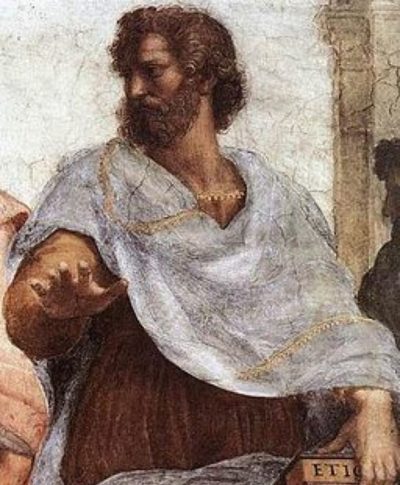 In this course, we will engage in a close reading of the whole of Aristotle’s Nicomachean Ethics. Like so many other works of ancient moral theory, the Nicomachean Ethics is principally concerned with the nature of human happiness and the means to its attainment. Our primary aim will thus be to get clear on Aristotle’s account of both. In the process, we shall endeavour to elucidate Aristotle’s stance on such fundamental questions of moral philosophy as: its proper method; the purpose of the state and the relation between moral philosophy and political science; the nature and varieties of moral virtue; the nature of choice and moral agency; the cognitive and affective components of moral action; the nature and varieties of moral weakness and moral fortitude; the nature and moral significance of friendship; and the nature and value of philosophical wisdom (or contemplation). There is no overstating the influence the Ethics has had on the history of moral philosophy. Our progress in this course will thus be facilitated – but also complicated – by the very long history of the reception of, and commenting upon, this seminal work. We will look to this history often to guide us in our reading, to offer different interpretive vantage points, and to feed our critical reflections. Finally, since Aristotle began his philosophical career as a student in Plato’s Academy, and he clearly learned a great deal from his master, we will read the Nicomachean Ethics with an eye to relevant Platonic texts and teachings.”
In this course, we will engage in a close reading of the whole of Aristotle’s Nicomachean Ethics. Like so many other works of ancient moral theory, the Nicomachean Ethics is principally concerned with the nature of human happiness and the means to its attainment. Our primary aim will thus be to get clear on Aristotle’s account of both. In the process, we shall endeavour to elucidate Aristotle’s stance on such fundamental questions of moral philosophy as: its proper method; the purpose of the state and the relation between moral philosophy and political science; the nature and varieties of moral virtue; the nature of choice and moral agency; the cognitive and affective components of moral action; the nature and varieties of moral weakness and moral fortitude; the nature and moral significance of friendship; and the nature and value of philosophical wisdom (or contemplation). There is no overstating the influence the Ethics has had on the history of moral philosophy. Our progress in this course will thus be facilitated – but also complicated – by the very long history of the reception of, and commenting upon, this seminal work. We will look to this history often to guide us in our reading, to offer different interpretive vantage points, and to feed our critical reflections. Finally, since Aristotle began his philosophical career as a student in Plato’s Academy, and he clearly learned a great deal from his master, we will read the Nicomachean Ethics with an eye to relevant Platonic texts and teachings.”
CLCV 3201A: Sparta (Susan Downie) Fall 2020
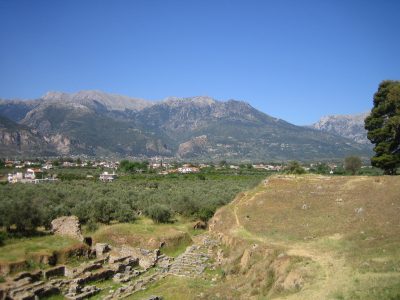 This course will examine in detail the history, culture, and institutions of ancient Sparta from the Bronze Age to the Classical period. It is NOT a course primarily about warfare, although that aspect of Spartan culture will be addressed. We will engage with stereotypes about the Spartans as we examine their form of government, law, religion, mythology, art and architecture, slavery, education and the unusual status of women in Spartan society. Various images of the ancient Spartans from antiquity to the present will also be addressed.
This course will examine in detail the history, culture, and institutions of ancient Sparta from the Bronze Age to the Classical period. It is NOT a course primarily about warfare, although that aspect of Spartan culture will be addressed. We will engage with stereotypes about the Spartans as we examine their form of government, law, religion, mythology, art and architecture, slavery, education and the unusual status of women in Spartan society. Various images of the ancient Spartans from antiquity to the present will also be addressed.
This course is entered as a “blended” course. Lectures will be posted but there will be the option of live interaction and questions / discussion most weeks
CLCV 3306A: The Greek Bronze Age (Susan Downie) Winter 2021
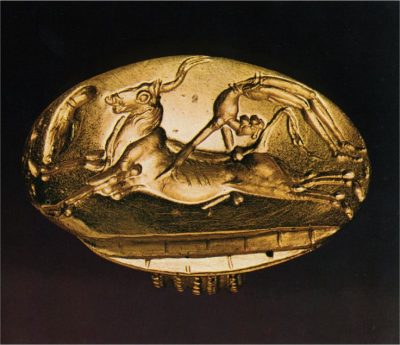 This course will focus on the three cultures that arose in Greece during the Bronze Age: Cycladic civilization, the Minoans, and the Mycenaeans. Emphasis will be placed on archaeological discoveries as evidence for the earliest history and beliefs of the Aegean, and as background to later Greek culture, but written records will also be addressed. We will discuss architecture, pottery, painting, jewellery and other minor arts to reconstruct these societies and their beliefs.
This course will focus on the three cultures that arose in Greece during the Bronze Age: Cycladic civilization, the Minoans, and the Mycenaeans. Emphasis will be placed on archaeological discoveries as evidence for the earliest history and beliefs of the Aegean, and as background to later Greek culture, but written records will also be addressed. We will discuss architecture, pottery, painting, jewellery and other minor arts to reconstruct these societies and their beliefs.
- For the student in Greek and Roman Studies, we are talking about the earliest cultures of the Aegean, both pre-Greek and Greek. They were formative not only on the history of later Greeks, but on their mythology, literature, art and society.
For the student of Art History, these civilizations are so early (ca.3000-1150 BC) they are primarily known from their material culture, although writing appears at the end of the period. They provide a case study of the limits and possibilities of knowledge that exist with interpretation of physical remains. - For the student of Religion, these cultures have been seen as foundational in the belief systems of early Europe, yet they demonstrate how truly the Aegean was the cultural and intellectual crossroads of the ancient world. Much of the most enduring evidence from early cultures witnesses the human relationship to the divine. This is also one of the most difficult aspects of any culture to understand once its people disappear. We will be talking about sacred architecture, objects and practices as witnessed from the material and written record of all three civilizations.
- Assuming that winter term will be also offered online, this course too will probably be entered as “blended”. Lectures will be posted but there will be the option of live interaction and questions / discussion most weeks.
CLCV 4800A: Seminar in Greek and Roman Studies; Roman Britain (Laura Banducci) Fall 2020
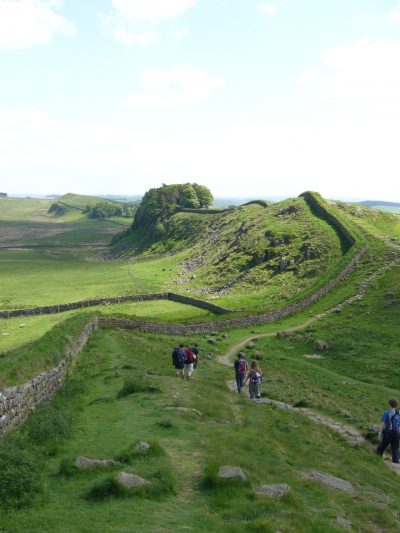 This seminar course focuses on the history and archaeology of Britain, from the Late Pre-Roman Iron Age until the departure of the Romans in the 5th century CE. Although we will touch on the ancient texts which mention Britain, our evidence will be largely archaeological. We will examine the major archaeological sites in Britain as well as learning some of the key questions historians and archaeologists have when they consider the nature of Roman rule on the island.
This seminar course focuses on the history and archaeology of Britain, from the Late Pre-Roman Iron Age until the departure of the Romans in the 5th century CE. Although we will touch on the ancient texts which mention Britain, our evidence will be largely archaeological. We will examine the major archaeological sites in Britain as well as learning some of the key questions historians and archaeologists have when they consider the nature of Roman rule on the island.
This course is ultimately tasked with considering:
How did the Romans conquer and hold on to this region?
How did the Roman presence change daily life in Britain?
How did different populations throughout Britain experience this period in history?
How do scholars exploit archaeological evidence to see “culture” and “resistance”?
What are the ways in which scholars have approached cultural change and colonial domination?
CLCV 4801A: Seminar in Greek and Roman Studies; Ancient Sicily (Elizabeth Klaassen) Winter 2021
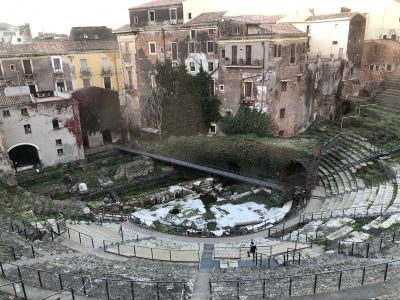 This seminar examines the history of ancient Sicily through its archaeology and literature. Our analysis will move chronologically and topographically as we consider such topics as;
This seminar examines the history of ancient Sicily through its archaeology and literature. Our analysis will move chronologically and topographically as we consider such topics as;
Colonization and the interaction between indigenous
Carthaginian, and Greek and Roman inhabitants
Tyranny
The disastrous Athenian expedition to Sicily
The Punic Wars between Carthage and Rome
The island’s critical position in the Mediterranean
Sites to be discussed include Taormina, Morgantina, Piazza Armerina, Syracuse, Agrigento, Selinunte, Mazara del Vallo, Marsala, Motia, Segesta, Himera, Solunto, and Palermo. Depending on student interest, some attention may be given to late antique and Medieval Sicily.